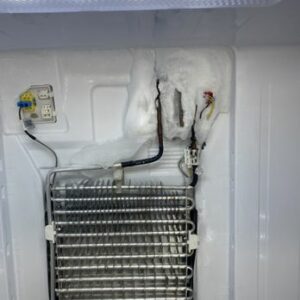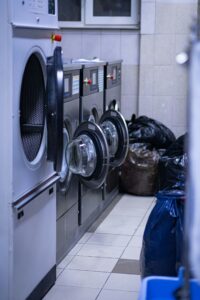Maintaining your washer is an essential part of keeping your laundry routine running smoothly. Regular maintenance not only extends the lifespan of your washer but also ensures that it performs at its best. Neglecting to maintain your washer can lead to various problems, including leaks, poor cleaning performance, and even complete breakdowns. By taking the time to properly care for your washer, you can avoid these issues and enjoy the benefits of a well-functioning appliance.
Regular maintenance of your washer offers several benefits. Firstly, it helps to prevent costly repairs or the need for a replacement. By addressing minor issues early on, you can avoid major breakdowns that may require professional assistance. Secondly, maintaining your washer ensures that it operates efficiently, saving you money on energy and water bills. A well-maintained washer uses less energy and water to clean your clothes effectively. Lastly, regular maintenance helps to keep your clothes clean and fresh. A properly functioning washer will remove dirt, stains, and odors from your garments, ensuring that they come out looking and smelling their best.
Key Takeaways
- Regular washer maintenance is important to ensure optimal performance and prevent common problems.
- Common washer problems include not starting, leaking, not draining, making strange noises, not spinning, overfilling, and not cleaning clothes properly.
- Troubleshooting tips for a washer that won’t start include checking the power source and door latch.
- Causes of a leaking washer can include a damaged hose or faulty pump, and solutions may involve replacing parts or tightening connections.
- A washer that is not draining properly may have a clogged drain hose or pump, and fixing the problem may require cleaning or replacing these components.
Common Washer Problems: A Comprehensive Overview
Homeowners often face various problems with their washers. Understanding these common issues can help you identify and address them promptly. One of the most common problems is a washer that won’t start. This can be caused by a faulty power supply, a malfunctioning door latch, or a problem with the control board. Another common problem is a leaking washer. Leaks can occur due to damaged hoses, loose connections, or a faulty water inlet valve. A washer that doesn’t drain properly is also a common issue. This can be caused by a clogged drain pump or a malfunctioning drain hose.
Other common problems include strange noises coming from the washer during operation and a washer that doesn’t spin. Noises can indicate issues with the motor, bearings, or belts. A washer that doesn’t spin may have a problem with the drive belt, motor coupling, or lid switch. Overfilling is another problem that homeowners may encounter. This can be caused by a faulty water level sensor or a malfunctioning inlet valve. Lastly, a washer that doesn’t clean clothes properly can be due to issues with the agitator, pump, or water temperature.
Washer Won’t Start: Troubleshooting Tips and Tricks
If your washer won’t start, there are several troubleshooting steps you can take before calling for professional help. First, check if the power supply is working by testing the outlet with another device. If the outlet is functioning correctly, ensure that the washer is properly plugged in. Next, check the door latch to ensure it is securely closed. If the door latch is loose or damaged, it may prevent the washer from starting. Lastly, check the control board for any error codes or malfunctions. If you see an error code, consult the user manual or contact the manufacturer for further assistance.
If none of these steps resolve the issue, it may be necessary to call a professional technician to diagnose and repair the problem. They will have the expertise and tools to identify and fix any underlying issues that may be preventing your washer from starting.
Washer Leaking: Causes and Solutions
A leaking washer can cause significant damage to your laundry room and surrounding areas if not addressed promptly. There are several reasons why a washer may leak. One common cause is a damaged or worn-out hose. Check all hoses connected to your washer for any signs of cracks, bulges, or leaks. If you find any issues, replace the hose immediately.
Another common cause of leaks is loose connections. Check all connections between the washer and water supply lines to ensure they are tight and secure. If you find any loose connections, tighten them using pliers or an adjustable wrench.
A faulty water inlet valve can also cause leaks. This valve controls the flow of water into the washer. If it is damaged or worn out, it may not close properly, leading to leaks. In this case, the water inlet valve will need to be replaced.
If you have checked all hoses and connections and the water inlet valve but still have a leaking washer, it may be necessary to call a professional technician. They can inspect your washer for any other potential causes of the leak and make the necessary repairs.
Washer Not Draining: How to Fix the Problem
If your washer is not draining properly, there are a few steps you can take to fix the problem. First, check for any clogs in the drain pump or drain hose. Remove any debris or foreign objects that may be blocking the flow of water. Next, check the drain hose for any kinks or bends that may be restricting the drainage. Straighten out the hose if necessary.
If these steps do not resolve the issue, it may be due to a faulty drain pump or a malfunctioning drain hose. In this case, it is best to call a professional technician to diagnose and repair the problem. They will have the expertise and tools to identify and fix any underlying issues that may be preventing your washer from draining properly.
Washer Making Strange Noises: Diagnosing the Issue

A washer that makes strange noises during operation can be quite alarming. However, these noises can often indicate specific issues that can be diagnosed and resolved. One common noise is a loud banging or thumping sound. This may indicate an unbalanced load. Stop the washer and redistribute the clothes evenly in the drum.
Another common noise is a squeaking or squealing sound. This may indicate an issue with the belt or motor bearings. Inspect the belt for any signs of wear or damage and replace it if necessary. If the noise persists, it may be due to worn-out motor bearings, which will require professional repair.
A grinding or rattling noise may indicate a problem with the motor coupling or transmission. These components may need to be replaced by a professional technician. Lastly, a humming or buzzing noise may indicate a problem with the motor or control board. In this case, it is best to call a professional technician to diagnose and repair the issue.
Washer Not Spinning: Common Causes and Fixes
If your washer is not spinning, there are several common causes that you can check before calling for professional help. First, check the lid switch to ensure it is functioning correctly. The lid switch is a safety feature that prevents the washer from spinning when the lid is open. If the switch is faulty, it may need to be replaced.
Next, check the drive belt for any signs of wear or damage. A worn-out or broken drive belt can prevent the washer from spinning. If you find any issues with the drive belt, replace it immediately.
If these steps do not resolve the issue, it may be due to a faulty motor coupling or transmission. These components will require professional repair or replacement. It is best to call a professional technician to diagnose and fix the problem.
Washer Overfilling: What You Need to Know
An overfilling washer can cause water damage and flooding in your laundry room. There are several reasons why a washer may overfill. One common cause is a faulty water level sensor or pressure switch. This component detects the water level in the washer and signals the inlet valve to shut off when the desired level is reached. If the sensor is malfunctioning, it may not send the signal to stop filling, resulting in an overfilling washer.
Another possible cause is a malfunctioning inlet valve. The inlet valve controls the flow of water into the washer. If it does not close properly, it will continue to fill the washer even when the desired water level is reached.
To prevent an overfilling washer, it is essential to address these issues promptly. If you suspect a faulty water level sensor or pressure switch, it may be necessary to call a professional technician to diagnose and replace the component. If the inlet valve is the problem, it will also need to be replaced by a professional.
Washer Not Cleaning Clothes Properly: Possible Reasons
If your washer is not cleaning clothes properly, there are several possible reasons that you can check before calling for professional help. First, check the agitator or impeller for any signs of damage or wear. These components are responsible for agitating the clothes and removing dirt and stains. If they are damaged or worn out, they may not clean the clothes effectively.
Next, check the pump for any clogs or obstructions. A clogged pump can prevent water from circulating properly, resulting in poor cleaning performance. Remove any debris or foreign objects from the pump to ensure proper functioning.
Lastly, check the water temperature settings on your washer. If the water is too cold or too hot, it may not effectively remove dirt and stains from your clothes. Adjust the temperature settings as needed to ensure optimal cleaning performance.
If these steps do not resolve the issue, it may be necessary to call a professional technician to diagnose and repair any underlying issues that may be affecting the cleaning performance of your washer.
Maintaining Your Washer for Optimal Performance
Maintaining your washer is crucial for optimal performance and longevity. By following a few simple tips, you can keep your washer in good condition and avoid common problems. Firstly, clean your washer regularly by running an empty cycle with hot water and vinegar to remove any buildup or residue. Secondly, check and clean the filter regularly to prevent clogs and ensure proper drainage. Thirdly, avoid overloading your washer as this can strain the motor and other components.
Additionally, be mindful of the type and amount of detergent you use. Using too much detergent can lead to residue buildup and poor cleaning performance. Lastly, schedule regular professional maintenance to inspect and service your washer. A professional technician can identify and address any potential issues before they become major problems.
By taking these steps, you can ensure that your washer operates efficiently, cleans your clothes effectively, and lasts for years to come. Don’t neglect the maintenance of your washer – it’s an investment that will pay off in the long run. Take action today and enjoy the benefits of a well-maintained washer.
If you’re struggling with common washer problems and need some guidance, check out our related article on “How to Extend the Lifespan of Your Washing Machine.” This informative piece provides tips and tricks to help you maintain your washer and prevent potential issues. From proper loading techniques to regular cleaning and maintenance, this article covers it all. Don’t let your washing machine become a headache – learn how to keep it running smoothly for years to come. Read more here.
What Precautions Should I Take When Decoding Common Washer Problems?
When dealing with washer troubleshooting safety precautions, it’s important to always unplug the machine before attempting any repairs. Use caution when working with electrical components and avoid getting water near any outlets or cords. Additionally, be mindful of moving parts and always follow the manufacturer’s guidelines.
Table of Contents
- Key Takeaways
- Common Washer Problems: A Comprehensive Overview
- Washer Won’t Start: Troubleshooting Tips and Tricks
- Washer Leaking: Causes and Solutions
- Washer Not Draining: How to Fix the Problem
- Washer Making Strange Noises: Diagnosing the Issue
- Washer Not Spinning: Common Causes and Fixes
- Washer Overfilling: What You Need to Know
- Washer Not Cleaning Clothes Properly: Possible Reasons
- Maintaining Your Washer for Optimal Performance
- What Precautions Should I Take When Decoding Common Washer Problems?
- FAQs
- What are some common washer problems?
- What are the symptoms of a leaking washer?
- What are the symptoms of a washer that is making excessive noise?
- What are the symptoms of a washer that fails to start?
- What are the symptoms of a washer that fails to spin?
- What are the symptoms of a washer that fails to drain?



